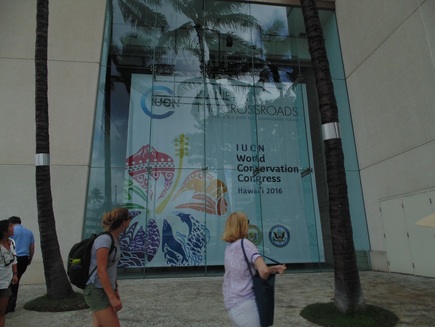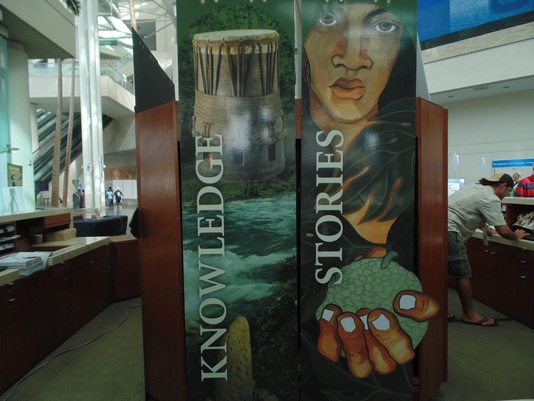|
Elizabeth Wulbrecht Our journey began at 9:30 am in front of the Purdue Memorial Union. We huddled into a sleek black mini-van, equipped with power outlets and leather seats, and began a comfortable ride to O’Hare international airport. The first leg of our journey over, we waited around the airport until our flight at 2:00 pm. Four hours later we arrived in Seattle. Seven hours later we arrived in Hawaii. Our exhausted team stumbled into bed at 5 am Lafayette time and 11 pm Hawaii time, but we’d made it to Honolulu and the WCC.  The World Conservation Congress, WCC, is associated with the International Union for the Conservation of Nature (IUCN). This year is the 22nd Congress and the United States is hosting the WCC for the first time (in our president’s home state)! This year’s theme is “planet at the crossroads,” indicating just how pivotal conservation is for the earth’s future and her people. Themes at this year’s WCC include declining biodiversity and the protection of marine resources, threatened by climate change and human intervention. The WCC sets the agenda for conservation around the globe and its final resolutions are taken up by conscientious NGOs, local governments, and nation-states. But, these resolutions are not legally binding like the COP21 Paris Agreement, and thus the influence of WCC's recommendations are hard to gauge. Local communities, indigenous peoples, and civil society will be at the WCC striving to ensure the future of their peoples and local resources. We will be following representatives of communities as they make claims for conservation and self-governance of protected territories. The Presence to Influence team seeks to identify and examine how historically underrepresented groups such as indigenous peoples influence policy-making and governance processes at global environmental events. The majority of protected areas are inhabited by indigenous peoples, yet their territory's resources are often governed by outside agencies and illegally encroached upon by extractive industries. Land management is changing as NGOs, governments, and organizations like the IUCN, began to realize the stewardship capabilities of indigenous communities. But even so, there are still barriers to the participation of indigenous peoples in governance processes and events like the WCC. There are unequal power relations between indigenous peoples and local and national governments. Indigenous peoples often do not have the resources or financial means to attend events like the WCC and thus are unable to share their stories and knowledge of conservation and climate change at these large international conferences. This project hopes to identify indigenous peoples' strategies for inclusion and influence in global environmental governance. We are interested in the claims for justice and recognition from indigenous peoples, such as those made at events like the WCC and the COP21.  This photo was taken today at the WCC and represents multiple interests of the team: the inclusion of indigenous knowledge and storytelling as a strategy for political influence within conservation governance.
0 Comments
|
In the field...Follow our team as we cover international environmental policy making meetings. Project Leaders:
Dr. Kimberly R. Marion Suiseeya, Department of Political Science, Northwestern University Dr. Laura Zanotti, Department of Anthropology, Purdue University Follow us on Twitter
(@Pres2Influence) Archives
December 2019
Categories |
 RSS Feed
RSS Feed
